(完整)小学四种时态归纳笔记,推荐文档.docx
(word版)小学英语语法时态讲解与归纳,文档

小学英语语法时态讲解与归纳—一般现在时一、一般现在时:1.表示事物或人物的特征、状态。
如:Theskyisblue.天空是蓝色的。
2.表示经常性或习惯性的动作。
如:Igetupatsixeveryday我.每天六点起床。
3.表示客观现实。
如:Theearthgoesaroundthesun地.球绕着太阳转。
二.构成及变化动词的变化。
肯定句:主语否认句:主语一般疑问句:+be(am,is,are)+ 其它。
如:Iamaboy. 我是一个男孩。
+be+not+ 其它。
如:Heisnotaworker. 他不是工人。
Be+主语+其它。
如:-Areyouastudent? -Yes.Iam./No,I'mnot.特殊疑问句:疑问词+一般疑问句。
如:Whereismybike?2. 行为动词的变化。
l、当主语为第一,二人称及复数时,助动词为do肯定句:主语+动词原形(+其它)。
如:Weoftenplaybasketballafter否认句:主语+don't+动词原形(+其它)。
如:wedon’tplaybasketballschool.after school.一般疑问句:Do+主语+动词原形+其它?如:Doyouoften playbasketballafterwedon't.schooll?Yes,wedo./No,特殊疑问句:疑问词+以do开头的一般疑问句?如:Whatdoyouoftendoafterschool?3、当主语为第三人称单数时,助动词为does肯定句:主语+动词三单式(+其它)。
如:Heswimswell.否认句:主语+doesn’t+动词原形(+其它)。
如:Hedoesn’tswimwell..一般疑问句:Does+主语+动词原形+其它。
如:Doesheswimwell?(1)Yes,hedoes./No,hedoesn't.(2)特殊疑问句:疑问词+以does开头的一般疑问句?(3)如:Howdoesyourfathergotowork?(4)(5)(6)三.第三人称单数的动词变化规那么〔只有在第三人称为主语的肯定句中,动词才用三单式〕(7)多数动词直接加s:runsgetslikescolletstakesplaysclimbs.(2)结尾是s,x,sh,ch,o,前为辅音字母,结尾加es:watchesteachesgoesdoeswashescrossesmixesbrushes(3)动词末尾y前为辅音:将y改为i加es:study →studiesfly→flies carry→carriescry→cries但在y前如果为元音那么直接加s: buys saysplaysstays(4) 不规那么变化常见的:have----has四.时间标志:always,usually,often,sometimes,every一般现在时练习题〔1〕一、写出以下动词的第三人称单数drink ________ go _______ stay________ make ________look _________ have_______ pass_______carry ____come________ watch______ plant_______ fly________study_______ brush________ do_________teach______二.用以下单词的适当形式填空often___________(play)intheplayground._________(get)upatsixo ’clock._________(brush)yourteetheverymorning?4.What________________(do)heusually________________(do) after school?________________(study)English, Chinese,maths,scienceandArt atschool.sometimes__________(go)totheparkwithhissister.eight,she__________(watch)TVwithherparents.Mike________(read)Englisheveryday?manylessons_________yourclassmates________(have)onMonday?time_________hismother_________(do)thehousework?三.改句子youoftenplayfootballafterschool?( 改为肯定句)havesomebooks. 〔改为否认句〕Shan’ssisterlikesplayingtable tennis 〔改为否认句〕livesinasmalltownnearNewYork. 〔改为一般疑问句〕watchTVeveryday. 〔改为一般疑问句〕havefourlessons. 〔改为否认句〕doesn’trunfast〔改为肯定句〕dogrunsfast.否认句:一般疑问句:hastwolettersforhim.一般疑问句:否认句:usuallyplayfootballonFridayafternoon. 否认句:一般疑问句:划线提问YangusuallywashessomeclothesonSaturday. 否认句:一般疑问句:划线提问: usuallywaterstheflowerseveryday.否认句:一般疑问句:doeshishomeworkathome.否认句:一般疑问句:一般现在时练习题〔2〕一、用所给动词的正确形式填空like____________(swim)._________(read)English everyd ay._________(go)toschoolatseveninthemorning.4.Mike________(go)toschoolatseveninthemorning .mother________(like)______(go)shoppi ng.can________(draw)many beautifulpictures.7.She_________(make)amodelplane.you________(like)_________(run)?he_________(like)_________(jump)?Nancy_________(grow)flowersonSaturday?teachers________(like)___________(dance).teacher________(like)____________(dance).students___________(speak)Englishinclass.student_________(speak)Chineseafterclass.Let’s____________andplayfootball.(go)He_____________likeswimming.(not)I’msorry____________that.(hear)WangBingis____________(write)anE-mailtohisfriend._________youstudyEnglishatschool?Yes,I___________.(do)20.__________yoursister studyEnglish atschool?No,she__________. (do)I’m_________better.(feel)Why__________Tomabsenttoday?(be)二、用所给的人称改写句子takephotosonSunday.(Mike)growbeautifulflowers.(she) likecollectingstamps.(Ben) listentomusiccarefully.(myaunt) likemakingamodelship.(Helen) cleantheclassroomeveryday.(he) lookafterthepandas.(MrWang) drawatreeandsomeflowers.(Nancy)gotobedateight.(mysister)readnewspapersintheevening.(MrGreen)人称代词与物主代词一、人称代词单数复数人称主格宾格主格宾格第一人称I me we us第二人称you you you youhe him第三人称she her they them it it二、物主代词数单数复数人称第一第二第三第一第二第三类别人称人称人称人称人称人称形容词性物主my your his her itsour your their代词名词性物主代(word版)小学英语语法时态讲解与归纳,文档11 / 1111mine yours his hersits ours yourstheirs词我们你们他〔她、汉语我的你的他的她的它的的的它〕们的。
(完整word版)小学英语时态汇总

小学英语 4 大时态(一般此刻时、一般过去时、一般未来时,此刻进行时)汇总表格时态定及用法一①常性或性的作;般②在刻的状、能力、性格或个状①always, usually, often,sometimes, hardly, ever,never;②every second / hour构◆一定句:◆否认句:1.主 +be(am, is, are) +⋯ 1.主 +be(am, is, are) +not+2.主 +(原形 /三 )+ ⋯ 2.主+don ’ t/doesn ’ t+原形例肯 I am a student.⋯否 I am not a student.+⋯疑Are you a student?现性等;③客真谛、客在存在或科学事;④格言或许名言时警语;一① 去常生的作;般②去存在的状;③ 去某个特定过生的作或存在的状;去④ 去生的一系列作;时/day / year / Friday/ June;③once a week, twicetwo weeks;①yesterday, yesterdaymorning/afternoon ⋯ .the day before yesterday,②before, the yearbefore last year,③in 1845/in the 1840s④last year/month/weekterm/Sunday/summer⑤just now; the otherday⑥段 +ago; longlong ago◆一般疑句:1.be(am, is, are)+主 +⋯肯回: Yes, 主 + be(am, is, are).否回: No, 主+am not/isn ’t/aren◆一定句:1.主 +be(was/were)+⋯2.主 +的去式 +⋯◆一般疑句:1.be(was/were)+ 主+⋯肯回: Yes, 主 + be(was/were).否回: No, 主+wasn’t/weren ’t.2.Do/Does+ 主+原形 +⋯肯回: Yes, 主 +do/does.’否t.回: No, 主 +don’t/doesn◆否认句:1.主 +be(was/were)+not+2.主 +didn ’ t+原形 +⋯2.Did+ 主 +原形 +⋯肯回: Yes, 主+did.否回: No, 主 +didn ’t.肯They get up early.否They don't get up early.疑Do they get up early?’t.肯He helps us.否He doesn't help us疑Does he help us?特别疑句:How often do you exercise?肯He was a student two years ago⋯否 He wasn't a student two years.疑Was he a student two years ago?肯They came back last night否They didn't come back last night.疑Did they come back last night?特别疑句:1.How was your school trip?2.When was he born?时态一般将来时在行定及用法一般未来主要表示:①将要生的作;②将要存在的状;③划、打当作某事;1.will/shall+ 原形shall 只用于第一人称 (I/we) ,常被 will 所取代; will 在述句顶用于各人称,在征求意常用于第二人称。
小学4种时态知识点总结
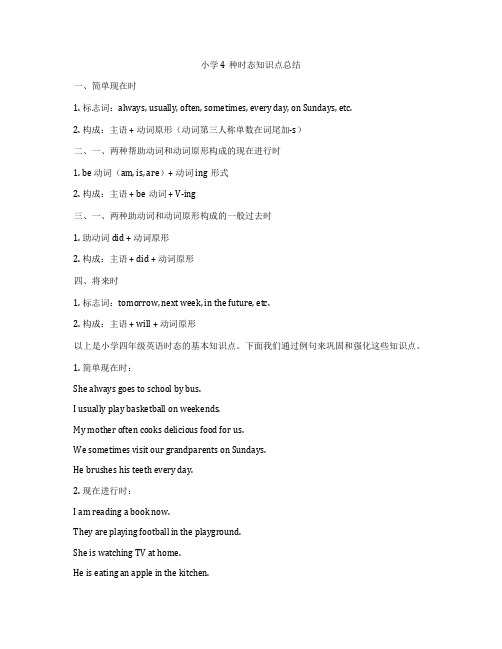
小学4种时态知识点总结一、简单现在时1. 标志词:always, usually, often, sometimes, every day, on Sundays, etc.2. 构成:主语 + 动词原形(动词第三人称单数在词尾加-s)二、一、两种帮助动词和动词原形构成的现在进行时1. be 动词(am, is, are)+ 动词ing形式2. 构成:主语 + be动词 + V-ing三、一、两种助动词和动词原形构成的一般过去时1. 助动词did + 动词原形2. 构成:主语 + did + 动词原形四、将来时1. 标志词:tomorrow, next week, in the future, etc.2. 构成:主语 + will + 动词原形以上是小学四年级英语时态的基本知识点。
下面我们通过例句来巩固和强化这些知识点。
1. 简单现在时:She always goes to school by bus.I usually play basketball on weekends.My mother often cooks delicious food for us.We sometimes visit our grandparents on Sundays.He brushes his teeth every day.2. 现在进行时:I am reading a book now.They are playing football in the playground.She is watching TV at home.He is eating an apple in the kitchen.We are swimming in the pool.3. 一般过去时:I watched a movie last night.He played with his friends after school.We visited the zoo on Sunday.She finished her homework yesterday.They cleaned their rooms this morning.4. 将来时:I will go to the park tomorrow.We will have a picnic next week.She will visit her aunt in the future.They will play video games in the evening.通过以上例句,我们可以看到不同时态的应用场景和句型结构。
(完整版)小学英语语法_四大时态(可编辑修改word版)
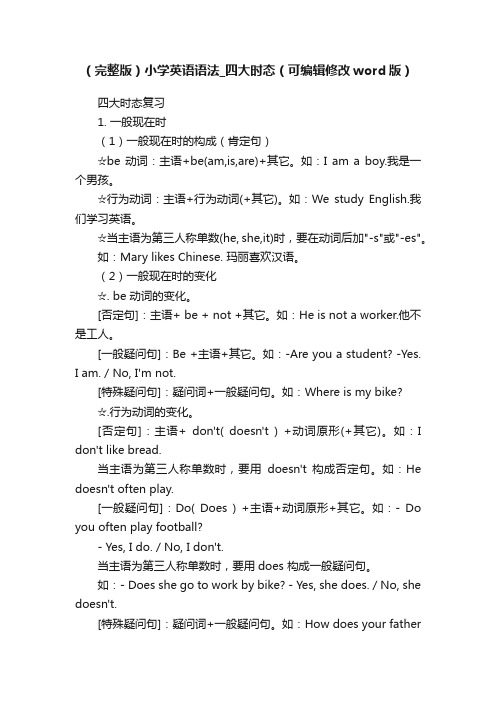
(完整版)小学英语语法_四大时态(可编辑修改word版)四大时态复习1. 一般现在时(1)一般现在时的构成(肯定句)☆be 动词:主语+be(am,is,are)+其它。
如:I am a boy.我是一个男孩。
☆行为动词:主语+行为动词(+其它)。
如:We study English.我们学习英语。
☆当主语为第三人称单数(he, she,it)时,要在动词后加"-s"或"-es"。
如:Mary likes Chinese. 玛丽喜欢汉语。
(2)一般现在时的变化☆. be 动词的变化。
[否定句]:主语+ be + not +其它。
如:He is not a worker.他不是工人。
[一般疑问句]:Be +主语+其它。
如:-Are you a student? -Yes.I am. / No, I'm not.[特殊疑问句]:疑问词+一般疑问句。
如:Where is my bike?☆.行为动词的变化。
[否定句]:主语+ don't( doesn't ) +动词原形(+其它)。
如:I don't like bread.当主语为第三人称单数时,要用doesn't 构成否定句。
如:He doesn't often play.[一般疑问句]:Do( Does ) +主语+动词原形+其它。
如:- Do you often play football?- Yes, I do. / No, I don't.当主语为第三人称单数时,要用does 构成一般疑问句。
如:- Does she go to work by bike? - Yes, she does. / No, she doesn't.[特殊疑问句]:疑问词+一般疑问句。
如:How does your fathergo to work?*动词+s 的变化规则1.一般情况下,直接加-s,如:cook-cooks, milk-milks2.以s. x. sh. ch. o 结尾,加-es,如:guess-guesses, wash-washes, watch-watches, go-goes3.以“辅音字母+y”结尾,变y 为i, 再加-es,如:study-studies2. 现在进行时(1)一般现在时的构成:be(am,is, are)+ 动词的ing 形式。
小学四种英语时态的归纳总结

否定句:Sb +didn’t+动词原形. (句中加didn’t,动词还原,其余不变)
一般疑问句:Did+sb +动词原形? (句首加did,动词还原,其余不变)Yes,sb did./No,sb didn’t.
语法:一般现在时
一般现在时:表示经常做的、习惯性做的动作或目前的状况。时间状语有every.../now/on Sundays,in the morning/afternoon/evening等;
1、第三人称单数做主语,动词词尾加“s”
动词词尾加“s”规则:
1)直接加s2)以o、s、x、sh、ch结尾,加es3)“辅音字母+y结尾”,变y为i加es
肯定句:Sb(第三单)+动词s+其它。
否定句:Sb(第三单)+doesn’t+动词原形+其它。(句中加doesn’t,动词还原,)
一般疑问句:Does+某人+动词原形+其它?句首加does,’t.
语法:一般将来时
一般将来时:表示“将来做... ...”,与表示将来的时间词连用,如tomorrow,next...。有两种形式表示将来。
be going to/will+动词原形
表示“打算做某事”,其中be包括am/is/are三种形式。I用am,他(三单)用is,其余用are.
1、肯定句:某人+be(am/is/are)+going to/will+动词原形。
否定回答:No,某人+be(am/is/are)/will+not(won’t)
小学四种英语时态的归纳总结
小学英语四大时态总结
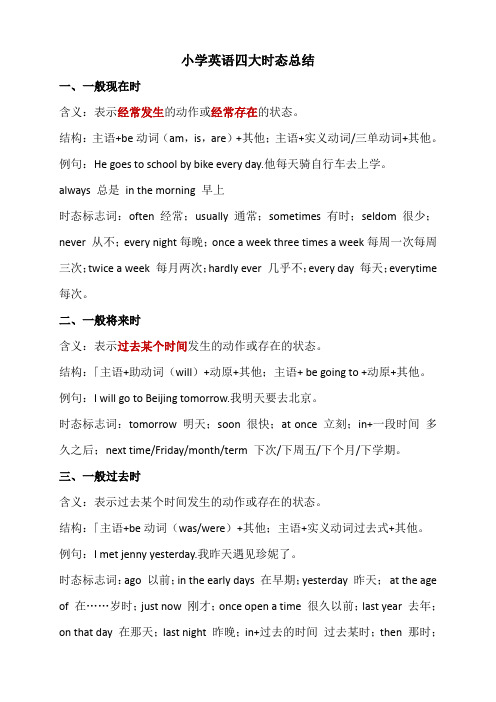
小学英语四大时态总结一、一般现在时含义:表示经常发生的动作或经常存在的状态。
结构:主语+be动词(am,is,are)+其他;主语+实义动词/三单动词+其他。
例句:He goes to school by bike every day.他每天骑自行车去上学。
always 总是in the morning 早上时态标志词:often 经常;usually 通常;sometimes 有时;seldom 很少;never 从不;every night每晚;once a week three times a week每周一次每周三次;twice a week 每月两次;hardly ever 几乎不;every day 每天;everytime 每次。
二、一般将来时含义:表示过去某个时间发生的动作或存在的状态。
结构:「主语+助动词(will)+动原+其他;主语+ be going to +动原+其他。
例句:I will go to Beijing tomorrow.我明天要去北京。
时态标志词:tomorrow 明天;soon 很快;at once 立刻;in+一段时间多久之后;next time/Friday/month/term 下次/下周五/下个月/下学期。
三、一般过去时含义:表示过去某个时间发生的动作或存在的状态。
结构:「主语+be动词(was/were)+其他;主语+实义动词过去式+其他。
例句:I met jenny yesterday.我昨天遇见珍妮了。
时态标志词:ago 以前;in the early days 在早期;yesterday 昨天;at the age of 在……岁时;just now 刚才;once open a time 很久以前;last year 去年;on that day 在那天;last night 昨晚;in+过去的时间过去某时;then 那时;the day before yesterday 前天;one day 一天last week/month/term 上周/上个月/上学期。
(完整word版)小学英语4种时态复习总结表

Be (am, is, are ) + V-ing
be 放主语前
be + not
What is / are +主语+ doing?
如:We’re listening now.
What are you doing now?
be动词 + 现在分词
(be+动词ing)
一般将来时
1、表示讲话或打算做某事
小学英语4种时态复习
时态
定义
பைடு நூலகம்标志词
谓语形式
疑问形式
否定式
提问谓语
一般现在时
1、表示当前或现阶段事物的状态、特征。
2、表示经常性、习惯性、规律性的动作。
3、表示客观真理、客观存在、客观事实。
频度副词:
例:always, usually, often,
sometimes, every day(month、week….)
2、将要发生的动作或存在的状态
3、表示打算、计划或意图要做的动作或事件。
1、tomorrow, the next day, this afternoon, this evening
2、next week (month, year…)
3、in the year 2007
1、be going to + V 原形
1、系动词be ( am, is, are)
行为动词原形(主语为第三人称单数时V + s, 或 es)
1、be 放主语前
2、主语前加do 或does (动词还原)
1、be + not
2、动词前加 don’t 或doesn’t (动词还原)
(完整)小学六年级英语四种时态总结,推荐文档
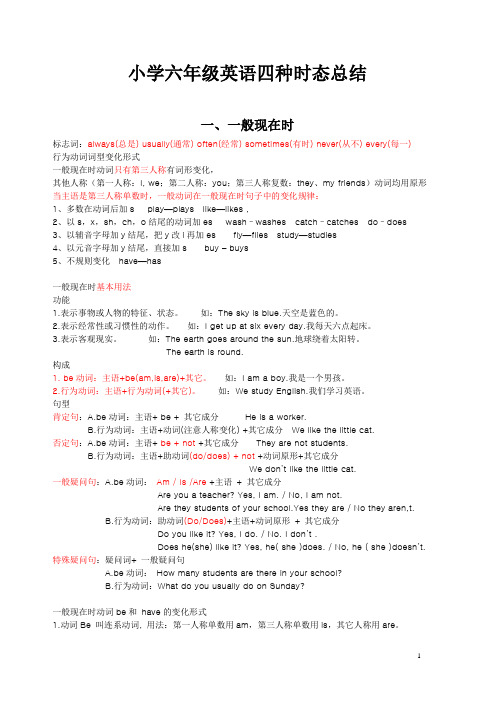
小学六年级英语四种时态总结一、一般现在时标志词:always(总是) usually(通常) often(经常) sometimes(有时) never(从不) every(每一)行为动词词型变化形式一般现在时动词只有第三人称有词形变化,其他人称(第一人称:I, we;第二人称:you;第三人称复数:they、my friends)动词均用原形当主语是第三人称单数时,一般动词在一般现在时句子中的变化规律:1、多数在动词后加s play—plays like—likes ,2、以s,x,sh,ch,o结尾的动词加es wash–washes catch–catches do–does3、以辅音字母加y结尾,把y改i再加es fly—flies study—studies4、以元音字母加y结尾,直接加s buy – buys5、不规则变化have—has一般现在时基本用法功能1.表示事物或人物的特征、状态。
如:The sky is blue.天空是蓝色的。
2.表示经常性或习惯性的动作。
如:I get up at six every day.我每天六点起床。
3.表示客观现实。
如:The earth goes around the sun.地球绕着太阳转。
The earth is round.构成1. be动词:主语+be(am,is,are)+其它。
如:I am a boy.我是一个男孩。
2.行为动词:主语+行为动词(+其它)。
如:We study English.我们学习英语。
句型肯定句:A.be动词:主语+ be + 其它成分He is a worker.B.行为动词:主语+动词(注意人称变化) +其它成分We like the little cat.否定句:A.be动词:主语+ be + not +其它成分They are not students.B.行为动词:主语+助动词(do/does) + not +动词原形+其它成分We don’t like the little cat.一般疑问句:A.be动词:Am / Is /Are +主语+ 其它成分Are you a teacher? Yes, I am. / No, I am not.Are they students of your school.Yes they are / No they aren,t.B.行为动词:助动词(Do/Does)+主语+动词原形+ 其它成分Do you like it? Yes, I do. / No. I don’t .Does he(she) like it? Yes, he( she )does. / No, he ( she )doesn’t.特殊疑问句:疑问词+ 一般疑问句A.be动词:How many students are there in your school?B.行为动词:What do you usually do on Sunday?一般现在时动词be和have的变化形式1.动词Be 叫连系动词, 用法:第一人称单数用am,第三人称单数用is,其它人称用are。
(完整word版)小学英语四种时态及口诀

小学英语四种时态及口诀一提到时态,就必定用到动词。
第一要明确两个观点:动词有五种形式,即:原形(形式),第三人称单数(形式),过去式(形式),此刻分词(形式),过去分词(形式)。
小学阶段,句子有以下四种常有时态,即:一般此刻时态;一般过去时态;一般未来时态;此刻进行时态。
式,意思就是各样不一样的形式,是对应着动词来说的;时态,意思就是表达各样不一样的时间的事情,是对应着句子来说的。
式与时,先搞懂差别。
一、一般此刻时态一般此刻时用法口诀一般此刻时, every, usually, often, sometimes.第一、二人称和复数,动词原形不变换。
除了 I, you ,复数外,动词后加s(es) 别忘却。
要变一般疑问句, be 动词提早很简单。
假如没有 be 动词, Do 和 Does 开头要注意。
否认句,很简单, not 在 be 动词后边站。
假如没有 be 动词, do, does 加 not 要切记。
请把这些规律记,一般此刻时没问题。
一般此刻时态,可能是两种意思。
第一,表示常常性的动作,常与 often, sometimes, usually, every day, every week, every month, everyyear 等表示频次的副词连用。
比如: He often goes swimming in summer.I usually go to work by bike.Sam visits China every year.第二,表示此刻的状态。
如: My mother is a worker.There is a computer in our classroom.注意问题:be (am, is, are) 动词就是独立的谓语动词,一个句子中有了 be(am, is, are) 就有了谓语动词了。
句子中不可以同时出现两个谓语动词。
许多同学常常出这样的错误:The boy is often eats hamburgers. (错)应改为:The boy often eats hamburgers.二、此刻进行时态正在进行时态口诀此刻分词用途多,进行时态不用说。
小学需掌握的四种时态语法归纳
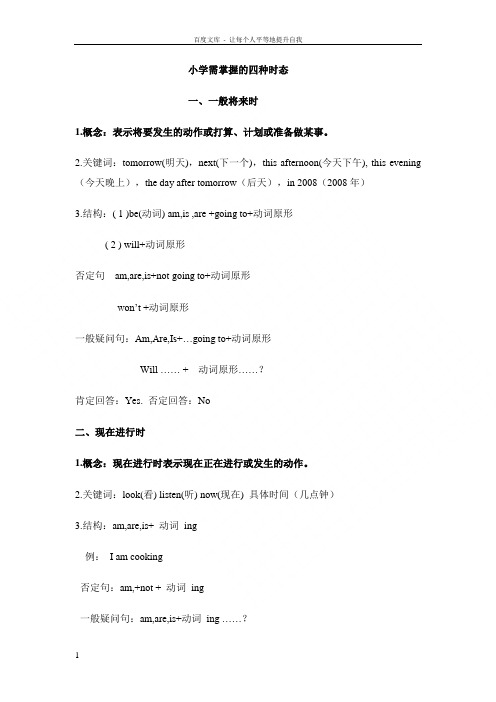
小学需掌握的四种时态一、一般将来时1.概念:表示将要发生的动作或打算、计划或准备做某事。
2.关键词:tomorrow(明天),next(下一个),this afternoon(今天下午), this evening (今天晚上),the day after tomorrow(后天),in 2008(2008年)3.结构:( 1 )be(动词) am,is ,are +going to+动词原形( 2 ) will+动词原形否定句am,are,is+not going to+动词原形won’t +动词原形一般疑问句:Am,Are,Is+…going to+动词原形Will …… +动词原形……?肯定回答:Yes. 否定回答:No二、现在进行时1.概念:现在进行时表示现在正在进行或发生的动作。
2.关键词:look(看) listen(听) now(现在) 具体时间(几点钟)3.结构:am,are,is+ 动词ing例:I am cooking否定句:am,+not + 动词ing一般疑问句:am,are,is+动词ing ……?肯定回答:yes. 否定回答:No4.动词加ing 的规律:1、直接加ing: go – going; do – doing2、以不发音的e结尾,把e去掉加ing : write – writing; have – having3、双写末尾字母加ing : run – running; swim – swimming skip—skipping sit – sitting begin – beginning get – getting put – putting shop –shopping三、一般现在时1.概念:表示经常性、习惯性的动作或行为。
2.关键词:always(总是) usually(通常) often(经常) sometimes(有时) never(从不) every(每一)3.结构:第一人称:I, we;第二人称:you;第三人称复数:they+动词原形(复数)Ben and Sally,my friends2 第三人称单数He,She,It,Janet(一个)+动词+ s ( es )例:He often goes to school at 7:0否定句I,we,you,They,Ben and Sally+don’t(不)+动词原形He,She,It,+doesn’t + 动词原形一般疑问句Do+I,we,you,they,Ben and Sally+动词原形。
小学的四大时态知识点总结
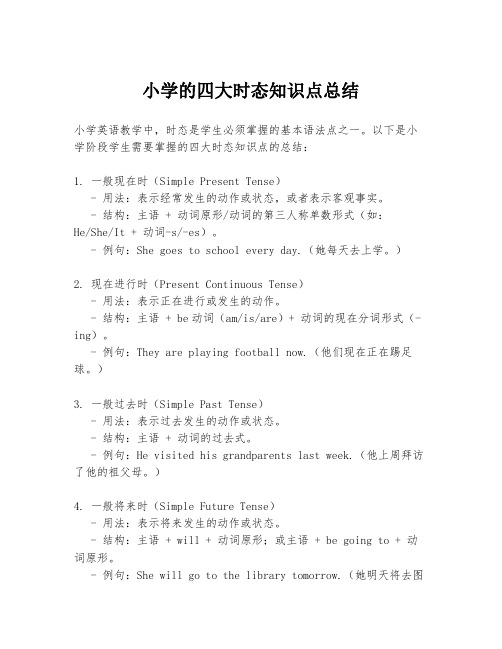
小学的四大时态知识点总结小学英语教学中,时态是学生必须掌握的基本语法点之一。
以下是小学阶段学生需要掌握的四大时态知识点的总结:1. 一般现在时(Simple Present Tense)- 用法:表示经常发生的动作或状态,或者表示客观事实。
- 结构:主语 + 动词原形/动词的第三人称单数形式(如:He/She/It + 动词-s/-es)。
- 例句:She goes to school every day.(她每天去上学。
)2. 现在进行时(Present Continuous Tense)- 用法:表示正在进行或发生的动作。
- 结构:主语 + be动词(am/is/are)+ 动词的现在分词形式(-ing)。
- 例句:They are playing football now.(他们现在正在踢足球。
)3. 一般过去时(Simple Past Tense)- 用法:表示过去发生的动作或状态。
- 结构:主语 + 动词的过去式。
- 例句:He visited his grandparents last week.(他上周拜访了他的祖父母。
)4. 一般将来时(Simple Future Tense)- 用法:表示将来发生的动作或状态。
- 结构:主语 + will + 动词原形;或主语 + be going to + 动词原形。
- 例句:She will go to the library tomorrow.(她明天将去图书馆。
)掌握这些基本时态对于小学生来说至关重要,它们是构建句子和表达思想的基础。
在学习过程中,学生应该通过大量的练习和实际应用来加深对这些时态的理解和运用。
同时,老师和家长也应该鼓励学生在日常生活中使用英语,以提高他们的语言能力。
通过不断的练习和应用,学生将能够更加熟练地掌握这些时态,并在英语交流中更加自信。
4种时态归纳笔记和练习

小学4种时态知识归纳一般现在时主要表示经常性或习惯性的动作或现在的特征、状态,由动词原形表示,如果是第三人称单数,动词要加s或es.动词变成第三人称单数时要注意:1.一般情况加s, 如read---reads2、以ch , sh , s , o 或x结尾的词加es , 如wash---washes3、以辅音字母加y结尾的词,变y为i再加es , 如try---tries现在进行时主要表示现在或这一阶段正在进行的动作,由is , am , are 加动词的ing形式构成。
一般过去时表示过去某个时间发生的动作或情况。
动词过去式的几种情况:1、直接加ed :play—played help--helped2、以e结尾的加d :close—closed live--lived3、以辅音加y结尾的把y 改成i加ed :carry—carried study—studied4、特殊形式(1) :come—came run—ran am—was不规则动词表一.用词适当形式填空。
1.Tom________(travel) Beijing by plane the day after tomorrow.2.The man ! _____________(have ) a cold yesterday.3. ______(be ) your mother at home yesterday? Yes,she ________4._______ you at school this morning? Yes, I________( be ).5.Janet said she ________(have) a headache yesterday.6. She was happy when she ________(finish) the work.7.________(be) you free tomorrow ? No, I________(be) not .8. ____Liu Tao ______ (fly) kites on the playground now ? Yes , he____.9.What time________(do) your mother________(get ) up yesterday?10.________he often _______(play )football ? Yes,he_________.11. What _____ you ______ (do) last Sunday? I _____ (play ) football.12.I________(see)a film on TV last evening.13.Don’t________(play)in the street.14.He__________ (pick ) and______ (eat) some apples yesterday.15.________(be) you ill yesterday? Yes,I_________(be).16._____your sister usually________(walk ) to school ?17.Tom _______(play) the piano every Saturday. Now he___________ (play).18.At 8:00 this morning . My mother ______________ (listen) to the radio.19.Ben_______ (help) the old man ___________ (clean) the room last night.20. _______ (be ) you at home last Sunday ? Yes, I ________21.Miss White _____ (be) at school every Sunday.22.I can ________(visit) Beijing now.23.What should I________(do),Miss White?24.I ___________(grow) trees last Sunday .25 .How many books_____ you_____(read) last night?26. He _______(feel) tired yesterday.20.______you _______(see)a film yesterday ? Yes, I ___________21.My grandpa loves _____ (eat) fresh vegetables.22. Sam always helps his mum _____ (cook) dinner after school.23. We must _____ (get up) early if we don’t want to be later for school.24. My mother still has much housework ______ (do) after dinner.25. Jim is always busy but he never _____ (feel) tired.26. My grandparents enjoy _____ (live) in the country.27. I walk to school. My home is near my school. It _____ (take) only ten minutes.28.Ted usually ____ (get) up at 7:30, but this morning he ____(be) late.29.Ellen usually ____ (do) her homework before she has supper, but yesterday she ____(do) her homework after she ______(have) supper.30. Listen! Our classmates _______ (sing) a wonderful song in the music room.二、选择填空( )1. All the _________ are very lovely.A. sheepB.sheepsC.sheepes( )2. These farmers usually __________ rice in this field.A. growB.plantC.plants( )3. There are seven _____________ near the river.A. banana treeB. banana treesC. bananas trees( )4. They are cutting grass _____________ the cows.A. feedingB.feedC. to feed( )5. Look! The boys are ___________ apples over there.A. pickB.pickingC. picks( )6. Do you have _________ chickens in your house?A. aB. anyC. some( )7. They __________ football in the playground now.A. playB. are playingC. will play( )8. There ___________ some juice in the bottle.A. isB. areC. am ( )9. Please give the grass __________ the horses.A. toB. forC. of ( )10.There are three ____________ in the field .A. childB. childrenC. childs ( )11. I can see some __________ in the zoo.A. deerB. deersC. of deer ( )12. I love ___________ football with my friends.A. playB. playsC. playing ( )13. I help my grandmother __________ the flowers.A. waterB. wateringC. to water ( )14.It’s 7:00. We must _________ up early.A. to getB. getC. getting ( )15.There _________ a lot of homework to do.A. isB.areC. am ( )16. John helps my father ___________ housework at the weekend.A.doB.doesC. doing ( )17. I can see some geese ________ the river.A. inB. onC.beside ( )18. Jack ____________ exercise every morning.A. takesB.is takingC. take ( )19. Do you help your mother __________housework?A. ofB. withC. in ( )20. I love my farm,because there ______ ________ fresh air.A. are; someB.is, manyC. is, plenty of ( )21. Look, this is a new friend __________ America.A. toB. fromC. on ( )22. The streets ___________ very clean and quiet now.A. areB.wasC. is ( )23. New Yorl is a big city ________ America.A.onB.inC.for ( )24. Everything here __________ very good and healthy.A.isB.areC. am ( )25.The city is modern __________ noisy now.A.andB.butC. am ( )26. The people __________ very good .A. isB.areC.am ( )27. Deng Xiaoping ________ in Guangan, Sichuan.A.is bornB. bornC.was born ( )28. Do you like _________ in Guangzhou?A. liveB. livesC.living ( )29. The streets are dirty. I don’t like __________.A. itB.themC.they ( )30. _________ is Guangzhou like now?A.WhatB. HowC. Where( )31. She didn’t talk much, She was _______ in class.A. quietB. excitedC. surprised( )32. She’s a ______ girl. Everybody likes her.A. shyB. tallC. polite( )33. My grandfather is a happy man. He _______ a lot.A. smilesB. worriesC. cries( )34. Y ou were short and thin _______ you were six years old.A. thenB.ifC. when( )35. My father ______ travelling to different cities when he was young.A. likeB.likesC. liked( )36. ______, my father went to work by car. Now, he rides a bike to work.A. ThenB. BeforeC. Later( )37.Put on some warm clothes. Don’t __________.A. get wetB. get tiredC. get a cold( )38. The film was________. The children were ________.A. exciting, excitingB. excited, excitingC. exciting, excited ( )39. The bus is _______. There are too many people on it.A. crowdedB. heavyC. dirty.( )40. He doesn’t talk much in the class. He is ______ most of the time.A. quietB. goodC. clever( )41. Y oun should drink more milk and _____ Coke.A. a littleB. more thanC. less( )42. Is this _____first visit to China?A. heB.himC.his( )43. I ____ you on TV last night.A. seeB. will seeC. saw( )44. I.m writing a letter. I’ll clean the kitchen________.A.nowB. laterC. yesterday( )45. A:What _____your school ______? B: It’s nice and big.A. does, likeB. does, lookC. is, like( )46. His mother asked him _______ one English story each day.A. to readB. readC. reads( )47. The secret to good health is _________.A. happyB. be happyC. to be happy ( )48. The picture in this book different ______ that one on the wall.A. withB. toC. and( )49. There is _____ more to see here.A. manyB. veryC. much( )50. Let’s go to the _______ and see the film.A. restaurantB. supermarketC. theatre。
完整版小学英语四大时态总结

小学英语四大时态总结小学英语四大时态总结一.一般现在时:1. 一般现在时的简单用法:表示经常的,习惯性的动作或存在的状态。
一般现在时经常与often,always,usually,sometimes,every day等时间状语连用。
否定句:主语+ be + not +其它。
如:He is not a worker.他不是工人。
一般疑问句:Be +主语+其它。
如:-Are you a student? -Yes. I am. / No, I'm not. 特殊疑问句:疑问词+一般疑问句。
如:Where is my bike? 5. 行为动词的变化。
否定句:主语+ don't( doesn't ) +动词原形(+其它)。
如:I don't like bread. 当主语为第三人称单数时,要用doesn't构成否定句。
如:He doesn't often play. 一般疑问句:Do( Does ) +主语+动词原形+其它。
如:- Do you often play football? - Yes, I do. / No, I don't. 当主语为第三人称单数时,要用does 构成一般疑问句。
如:- Does she go to work by bike? - Yes, she does. / No, shedoesn't. 特殊疑问句:疑问词+一般疑问句。
如:How does your father go to work? 二.现在进行时:1.现在进行时:表示现在正在进行或发生的动作,也表示当前一段时间内的活动或现阶段正在进行的动作。
2.结构:be ( am, is, are )+doing (所有的动词+ing)3.ing 的变化规则:2).现在进行时的一般疑问句把be动词调到句首。
Is he working at home? 3).现在进行时的特殊疑问的基本结构为:特殊疑问词+ be + 主语+ 动词ing? What are you doing? 三.一般过去时:Page 1 of 6.I. 一般过去时的概念:表示过去某个时间发生的动作或存在的状态。
小学四种英语时态的归纳总结

千里之行,始于足下。
学校四种英语时态的归纳总结学校英语时态的归纳总结在学校阶段学习英语,把握四种基本的时态是格外重要的。
这四种时态分别是一般现在时、一般过去时、一般将来时和现在进行时。
以下是对这四种时态的归纳总结。
一、一般现在时(Simple Present Tense)1. 表示经常性的动作或状态。
例如:I play basketball every Saturday.2. 在陈述句中,主语和动词要全都。
例如:He likes to watch movies.3. 在否定句中,用do / does + not + 动词原形。
例如:She does not like vegetables.4. 在疑问句中,用do / does + 主语 + 动词原形?例如:Do you have any pets?5. 用于表示客观事实、阅历等。
二、一般过去时(Simple Past Tense)1. 表示过去发生的动作或状态。
例如:I watched a movie yesterday.2. 在陈述句中,动词过去式的变化规章是直接加-ed。
例如:We played soccer last week.3. 在否定句中,用did + not + 动词原形。
例如:She did not go to school yesterday.4. 在疑问句中,用did + 主语 + 动词原形?例如:Did you finishyour homework?第1页/共3页锲而不舍,金石可镂。
三、一般将来时(Simple Future Tense)1. 表示将来发生的动作或状态。
例如:I will go to the park tomorrow.2. 在陈述句中,用will / shall + 动词原形。
例如:She will visither grandparents next week.3. 在否定句中,用will not / won't + 动词原形。
- 1、下载文档前请自行甄别文档内容的完整性,平台不提供额外的编辑、内容补充、找答案等附加服务。
- 2、"仅部分预览"的文档,不可在线预览部分如存在完整性等问题,可反馈申请退款(可完整预览的文档不适用该条件!)。
- 3、如文档侵犯您的权益,请联系客服反馈,我们会尽快为您处理(人工客服工作时间:9:00-18:30)。
小学 4 种知
1.一般现在时
一般在主要表示常性或性的作或在的特征、状,由原形表示,如果是第三人称数,要加s 或 es.动词变成第三人称单数时要注意:
1.一般情况加s,如read---reads
2、以 ch , sh , s , o或x尾的加
3、以音字母加y 尾的,y
es ,
i 再加
如 wash---washes
es , 如 try---tries
一般在 (表示常做、做)
关: never , sometimes , often , usually , always, seldom, every
肯定句子构: 1 )主 +原形2)主(第三人称数)否定句子构:主+ don’t/ doesn’t+原形
疑句子构:do / does +主+原形?
等
+s/es
2.现在进行时
在行主要表示在或一段正在行的作,由is , am , are加的ing形式构成。
在行(表示正在做某事)
关: now , look , look at, listen等
肯定句子构:主+ be +ing
否定句子构:主+ be not +ing
疑句子构:be +主+ing ?
3.一般将来时
一般将来主要表示将要生的作或状,由will , shall , be going to加原形构成。
关: tomorrow , nex
肯定句子构:1)主
否定句子构:1)主
疑句子构:1) be +
一般将来(表示将要去做某事)
t ⋯等表示将来的
+ be going to +原形
+ be not going to +原形
主+ going to +原形?
2)主
2)主
2) will +
+will +原形
+ will not+ 原形
主+ 原形?
4.一般过去时
一般去表示去某个生的作或情况。
动词过去式的几种情况:
1、直接加 ed : play —played help--helped
2、以 e 尾的加 d : close —closed live--lived
3、以音加 y尾的把 y 改成 i 加 ed: carry —carried study—studied
4、特殊形式 (1): come —came run —ran am —was
5、特殊形式 (2) : put —put let—let
一般去(表示去曾做某事)
关: yesterday , last⋯ , ago,⋯ before, in 2013等表示去的
肯定句子构: 1 )主 + was / were +形容 / 介短2)主 + 有的去式
否定句子构: 1 )主 + was / were not + 形容 / 介短
2)主 + did not +原形
疑句子构:1) was / were + 主 + 形容 / 介短?2) did + 主 + 原形?。
